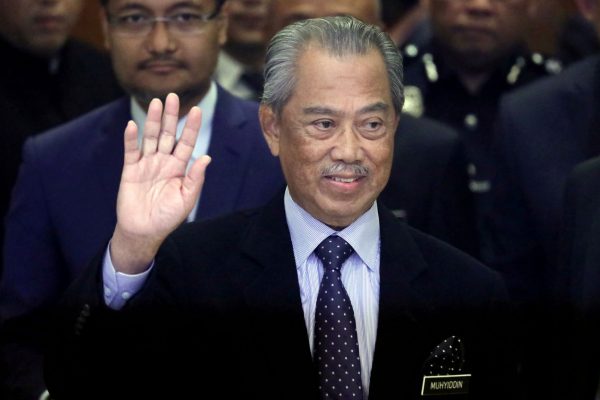Muhyiddin’s Perikatan Nasional (PN) government — commanding a razor-thin majority in the federal parliament — comprises several parties including the Malaysian United Indigenous Party (Bersatu) and the Pan-Malaysian Islamic Party (PAS), and is allied with other ‘PN-friendly parties’ including the United Malays National Organisation (UMNO). Gaining control of Sabah would augment PN’s position and Muhyiddin’s premiership.
UMNO stands as a formidable political force in the state. If it secures the state government in the polls, this will likely ease strained relations between UMNO and Muhyiddin’s party, Bersatu, and fortify the fragile PN government overall.
Some UMNO leaders had previously clamoured for UMNO to withdraw from PN and trigger a general election to take over the premiership from Muhyiddin. Given that Bersatu lacks sufficient grassroots presence and is the smallest Malay-based party in PN, appeasing the larger and more dominant UMNO is a crucial trade-off for Muhyiddin to strengthen his position.
Muhyiddin also unified PN by escalating efforts to undermine the opposition coalition Pakatan Harapan (PH) and its allies. Former Sabah chief minister Shafie Apdal is the opposition’s potential prime ministerial candidate as proposed by Muhyiddin’s nemesis and former prime minister Mahathir Mohamad. Shafie’s deposition as chief minister in July was a significant blow for PH and — in particular — for Mahathir and the opposition in East Malaysia.
While PN was successful in unseating Shafie through soliciting the defections of elected representatives, it failed to simply seize the state government as it had recently done in other peninsular Malaysian states. Shafie’s countermove — to obtain the consent of the Sabah Governor to dissolve the assembly and pave the way for fresh polls — demonstrates the rupture in the federal government’s conventional dominance in negotiations and the bending of state leaders to its political and financial pressures.
In recent years East Malaysian states have taken advantage of a weakening federal government — with thinning parliamentary majorities — to assert their political agency.
Owing to Malaysia’s centralised system of federalism, the federal government has access to the lion’s share of government revenue and states are largely dependent on the federal government to facilitate their development. States led by opposition parties have reportedly found their access to federal allocations stymied.
In July 2020, Sabah’s then deputy chief minister raised concerns over the Finance Ministry’s withdrawal of over RM300 million (US$72 million) in allocations for Sabah’s school infrastructure projects and suggested that the federal government was harbouring plans to revoke more funds.
PN also recently decided against tabling in parliament the final report from the Cabinet Special Council (CSC) to review the implementation of the Malaysia Agreement of 1963 (MA63), which recognises the status of the states of Sarawak and Sabah as equal partners in the Malaysian federation. This report was prepared by the previous PH administration, which touted it as a critical step towards addressing East Malaysians’ claim to their rightful autonomy and state resources.
PN has now classified the report as an official secret under the Official Secrets Act 1972. This move raises the possibility of new ‘closed-door’ deals being struck between political elites in light of impending elections in East Malaysia and the next General Election, in which PN would require the support of its East Malaysian allies to remain in power.
PN also suspended the formation of a Parliamentary Select Committee (PSC) initiated by the PH government to monitor and check the CSC’s implementation of the MA63. This measure effectively reverses PH’s plans to include MPs from both sides of the political divide in the process. Shelving the establishment of the PSC reduces accountability and increases the opacity of negotiations between federal and East Malaysian state leaders.
As elections loom, Shafie is accelerating the disbursement of thousands of ‘native land titles’ to the indigenous people in Sabah. Native land rights have been a long-standing issue for the large segment of indigenous villagers in the state so Shafie’s initiative might be rewarded by the voters.
Former chief ministers and political heavyweights returning under local-based parties such as Parti Cinta Sabah and the Liberal Democratic Party are also expected to split the vote and emerge as ‘kingmakers’ if there is no clear majority in the polls.
Fresh elections may not assure political stability. Party-hopping is the abiding political culture of Sabah and state elected representatives tend to jump ship to align themselves with the federal government — in the name of accessing financial allocations.
Initial dissent over leadership and seat allocations in the state polls added fuel to the heated intra-elite power contestation between Bersatu and UMNO. This was promptly placated when Bersatu stated that it was willing to compromise on seats to accommodate its partners.
Bersatu also requested to join Muafakat Nasional — the Malay-based pact between UMNO and PAS. This followed UMNO’s declaration that it would withdraw from talks with Bersatu to register PN as an official coalition, as a signal of its disgruntlement at the conviction of its former party president and prime minister Najib Razak.
PAS has recently also thrown its hat into the ring announcing that it will contest in the state elections and is negotiating seats with its allies. Parti Solidariti Tanah Airku (STAR) and the Sabah Progressive Party (SAPP), component parties of PN, and Parti Bersatu Sabah (PBS), an ally of PN, are also eyeing seats in Sabah, further complicating matters. The state polls will serve as a litmus test of Muhyiddin’s ability to keep PN and its allied parties united to work together and win elections. This is critical given the precarity of the federal government and the possibility of an early general election.
Piya Raj Sukhani is a research analyst at the S Rajaratnam School of International Studies, Nanyang Technological University.

